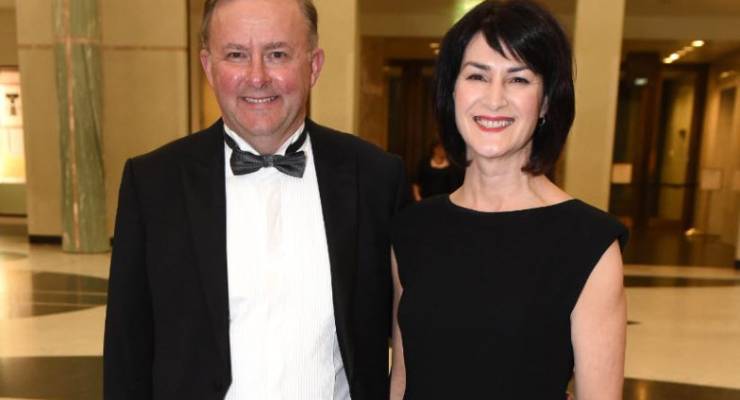
It is rare in public life that we see a simple statement that declares a personal relationship is over. No media chase. No paparazzi getting flicked away or abused. No avoidance of questions and no scalp for mainstream journos to claim as their own.
Yet this is exactly what we saw over the break, when Anthony Albanese announced that he and his wife of 30 years, Carmel Tebbutt, had split. No drama. Just a declaration that it was over and that there was no third party involved:
I am deeply saddened that my relationship of over 30 years with Carmel Tebbutt has ended in separation. We will continue to share parenting responsibilities of our 18-year-old son Nathan, who has successfully completed his HSC and has developed into an outstanding young man who we are both proud of.
This simple and erudite statement is a masterclass in how to properly deal with a personal situation. The story vanished almost as quickly as it appeared.
Getting ahead of the story
Can you imagine how differently the Barnaby Joyce and Andrew Broad sagas would have been if they had adopted a similar approach? A separation is different to an extra-marital affair but, no matter what the situation, secrecy is nearly always the worst approach.
Nothing raises the interest of journos more than when there’s the scent of blood in the air because a network of people around a politician are denying something is true. Admitting in a simple statement that something has happened — whatever that thing happens to be — is often likely to kill the yarn. Failing to admit something has gone awry simply makes it more attractive for folks in the media — like me — to pick up their shovels and go digging.
This excavation is made all the more likely due to social media too. Mainstream and independent media outlets will chase the full length of the Hume Highway and then some, and people on Twitter will persist in publishing rumours and innuendo that then need to be followed up.
Australia’s political landscape is littered with examples of private matters that have been strewn across front pages. Consider the numerous scandals about politicians’ children. The most notable example of these comes from the early part of the Hawke-Keating government when then prime minister Bob Hawke needed to publicly address issues related his daughter’s drug addiction. Hawke faced a month of rumours, tabloid turmoil and political attacks — all of which worsened the already difficult personal situation — before fronting the media and speaking (with great passion) about it.
Affairs and liaisons lead to similarly tricky ground — especially when politicians fail to acknowledge matters in books that are purportedly matters of public record. Veteran political journalist Laurie Oakes gave Cheryl Kernot and Gareth Evans some heartburn when he revealed their affair — a five-year relationship that was omitted from Kernot’s memoir on her time in politics. Evans admitted to lying about the affair to protect his family, Canberra journos came under fire for not reporting it sooner, and Kernot tried to instigate an investigation into whether her private emails were leaked to Laurie Oakes.
Rather messy, don’t you think?
A playbook for pollies
When a public figure immediately clarifies personal matters, they show a high degree of self-awareness about the fact their life is often seen as public property. Changes in relationships are not private affairs when politicians are seen publicly (and often campaigning) with family; this is especially true when the politician’s family is used in political advertising and advocacy for ‘traditional family values’. The public will make allowances for human flaws, but voters have a right to note hypocrisy.
So, how should it be done? Reflect not just on what you say and how you say it, but also to whom you want to say it. Distributing the story everywhere via media release on the same day often dampens the enthusiasm for a follow up. Being honest and telling everybody that might want to know simply makes it less likely to blow up in the same way.
Look at the way former senator Scott Ludlam announced his leave from parliamentary duties to deal with mental health issues. Any insider gossip or tabloid snooping was immediately killed by a short and honest statement about the situation; there was little follow-up beyond praise for his forthrightness.
Taking the initiative and telling the story before your personal life becomes an excavation site for the nation’s media means that you just might make yourself less interesting for five minutes. Then you can get on with dealing with your “private stuff”.
What do you think of this approach? Do we have a right to information on these ‘private’ matters? Send your thoughts to boss@crikey.com.au.








The Albanese/Tebbutt approach to killing a story would never have worked in Barnyard’s case.
A nauseatingly moralising family values exponent who has an extramarital affair and gets a staffer pregnant is hardly able to kill a story he has been hiding from everybody and his long suffering wife.
I cannot imagine Mrs Joyce wanting to do anything other than to express the deeply hurt feelings that his betrayal had caused.
Yeah, no maybe. Seems to have worked ok with Albanase and Tebbut. Did notice there were still some pretty nasty posts on social media and msm reports all the same. Maybe just not being a downright hypocrite about what you say and do is the best policy in private and public life.
Being frank and truthful requires a spine. Sadly many politicians appear to lack this vital structure, the senior ones hiding behind media advisors whose sole mission is to present the boss in the best light. Hence the PR stories in Women’s Weekly et al, soft interviews on commercial TV and welcoming Annabel Crabb into their kitchens.
Frankness is anathema to those stuck on the spin cycle. Albanese and Tebbutt stand above the gaggle.
Perhaps I have the wrong dictionary, but am not sure how the Albanese statement qualifies as “erudite”.
yep
This article is a thinly disguised justification for media snooping around politicians’ private lives. Telling them just to “tell all, then we’ll leave you alone”—well it’s a win-win all around isn’t it? Except it isn’t. Most of us don’t want to tell the media about changes in our relationship status. The fact that politicians campaign with family or use them in political advertising is not an excuse for digging around in those relationships. We need all the talented people in politics we can get, but media intrusion into family life just helps drive talented people away, if they aren’t willing to undergo that sort of scrutiny.
I don’t usually defend conservatives, but it’s not fair to hold conservatives up to a higher standard on the basis that they have spruiked ‘family values’ and then failed to uphold those values. Homophobes should be criticized for being homophobes, not for meeting women on dating websites.
Well said! And ultimately, this entire piece is based around a false assumption: whatever may have been the case decades ago, divorce is in no way whatsoever controversial in Australia in 2019. What we should be asking is why affairs (also decisions made by consensual adults that are none of our business) still seem to be.